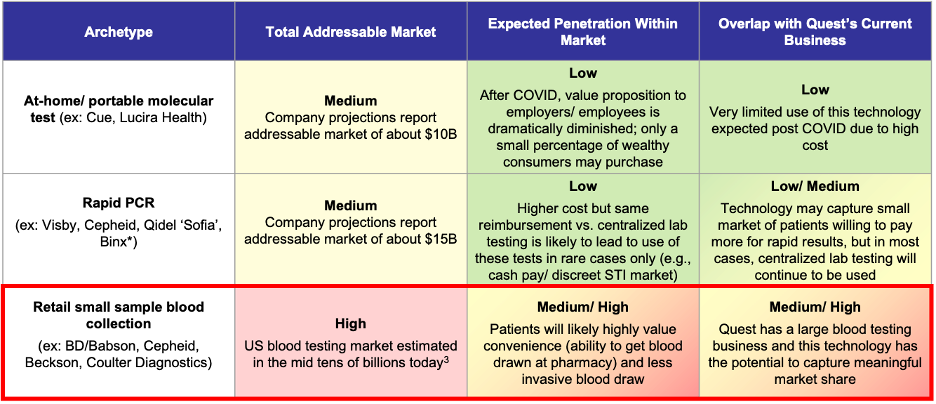Quest Diagnostics
Project Background and Objectives:
Quest is a large, publicly traded diagnostics company with a focus on centralized lab testing (involves obtaining a sample at a collection site [e.g., physician office, patient service center] and then having it delivered to a centralized laboratory where tests are run using high throughput processing). Point of Care Testing (POCT; testing at or near the point of care, producing actionable results within minutes) is growing rapidly, partially accelerated by COVID. POCT has the potential to capture market share from existing centralized lab tests, and as a result, Quest sought to better understand potential risks and opportunities stemming from growth in POCT.
The primary project objective was to evaluate the business models and likelihood of commercial success for a few emerging POCT companies/ technologies and then evaluate if/how Quest should act to in response to these technologies.
Methodology:
We completed this project over four phases:
1. Assess the broader POCT market and evaluate key drivers and barriers to POCT market penetration
2. Identify the three most promising POCT archetypes based on their potential to impact the current centralized lab testing market
3. Evaluate business models, key competitors, and long-term potential for each of the three POCT archetypes identified in Phase 2
4. Develop recommendations for Quest on respond to risks/ capitalize on opportunities driven by potential emergence of the three prioritized POCT archetypes
To ground our analysis across these phases, we conducted interviews with Quest team members, physicians, pharmacists, and POCT competitors. We then supplemented findings from these interviews with company analyst reports, secondary research, and our team’s experiences/perspectives.
Results:
Based on the primary research and feedback from the Quest core team, we prioritized three POCT archetypes:
· At home molecular tests
o At home test device currently being used for COVID/ flu (planned expansion into other areas such as STIs, RSV, HIV)
o Requires new cartridge for each test
· Rapid PCR tests
o Single use, disposal test
o Currently used for COVID, STIs, Strep, Flu
o Requires administration at a CLIA waived setting (e.g., physician office)
· Retail small sample blood collection
o Blood collection technology that requires much less blood (~1/10) than traditional venipuncture
o Enables blood collection at retail settings (e.g., pharmacy)
We then analyzed each of the three business models and developed a framework to assess the threat that each archetype poses for Quest’s business model.

Based on our analysis of the three archetypes, we believe only Retail Small Sample Blood Collection poses a potential threat to Quest. Both Rapid PCR and At Home Molecular Testing suffer from poor economics (at home molecular testing will be too expensive for most consumers, and rapid PCR costs have the same reimbursement amounts as cheaper centralized lab testing). Retail Small Sample Blood Collection has the potential to disrupt the blood testing market by offering patients increased convenience (as they can get tested at retail pharmacies) with a less invasive blood draw (finger prick).
Recommendations:
We recommended that Quest consider partnering with or acquiring a company with small sample blood collection technology as this technology has the potential to disrupt pieces of the blood testing market. The other technologies do not offer a significant enough threat to warrant action by Quest.
Final Thoughts:
We greatly enjoyed working with the Quest Diagnostics team (especially Kirk Wilson, Jennifer Tsao, and Patrick Doolittle) and benefitted from their extensive experience/ knowledge. We also learned through this project how to work across a cross-functional team, how to structure a complex problem into a clear set of choices, and how to best guide client decision-making.
Columbia Team: Alexandra Thompson, Esther Petit-Frere, Mike Exter, Myles LaValley, Vignesh Rajendran